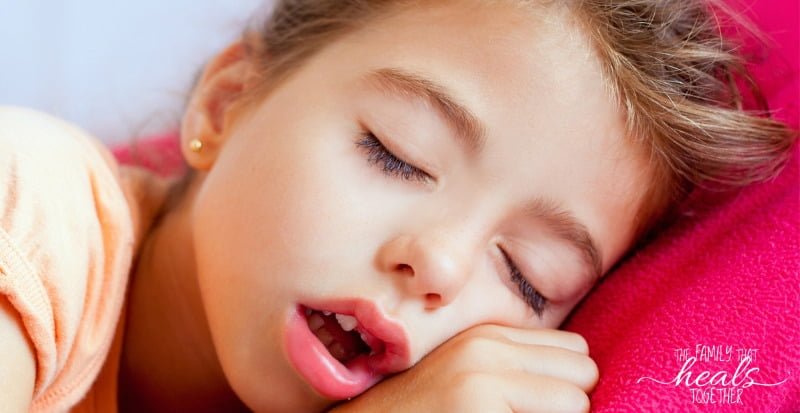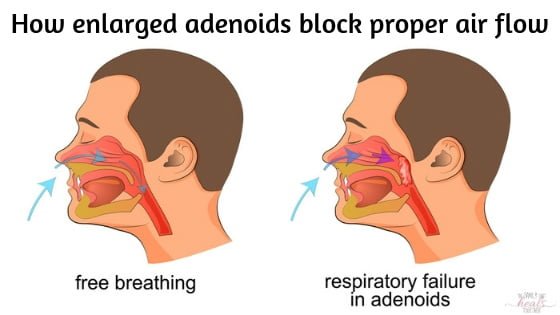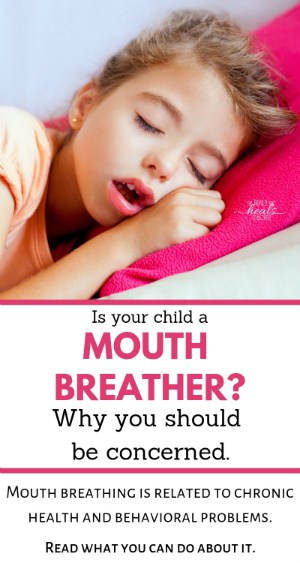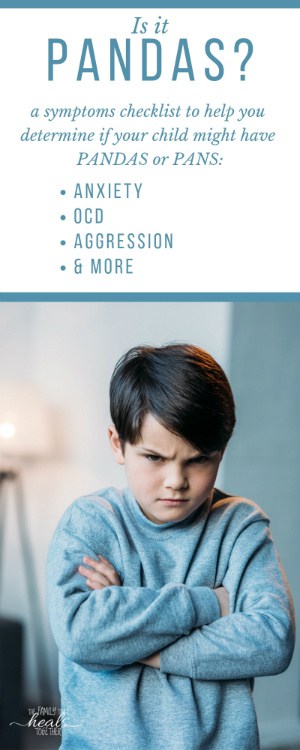Mouth breathing in children is a growing topic these days, especially for parents whose children have PANDAS symptoms or ADHD. Parents are learning that the effects of mouth breathing may include behavioral symptoms, but mouth breathing just might be at the root of all disease. Read more below.
What causes mouth breathing?
Mouth breathing occurs when there is an obstruction from the sinuses to the airways. When a child (or grown up) is unable to breathe efficiently through their nose, they will breathe through their mouth.
Obstructions can be caused by temporary congestion due to seasonal allergies, a cold, or a sinus infection. An obstruction may also lead to chronic mouth breathing due to enlarged tonsils or adenoids.
Tonsils and adenoids can be enlarged for a number of reasons, including chronic or recurring infections like strep, as well as food allergies (dairy is often a culprit). The photo below shows how enlarged adenoids can block proper air flow through the sinuses.
In addition, the shape of your jaw and palate can cause mouth breathing. Mouth breathing is also associated with tongue and lip ties, crooked teeth, and MTHFR mutations.
Jump to “Does Mouth Breathing Change Your Face?” to learn about why today’s children struggle with jaw and palate malformation.
How do you know if your child is mouth breathing?
As in the picture below, your child will sleep with his mouth open, rather than closed, and may snore. Mouth breathing in children is easy to spot during both waking and sleeping hours.
When your child is awake, you will notice he or she most likely sounds congested when breathing and his mouth will be open when he is at rest (not talking, eating, or otherwise using his mouth). Mouth breathing tends to be loud compared to breathing through the nose.
If your child is a mouth breather, you may also notice:
- dry chapped lips
- dry mouth
- bad breath
- snoring
- allergy shiners (purplish or red circles beneath your child’s eyes, often associated with food allergies, but may also be from chronic sinus problems).
Is mouth breathing bad?
The effects of mouth breathing can be detrimental to you or your child’s health, leading to both physical and behavioral problems. Let’s look deeper into why mouth breathing in children can cause long-term problems.
Why is it bad to be a mouth breather?
- Mouth breathing can cause sleep apnea. Mouth breathing during sleep lead to sleep apnea, a condition in which breathing is interrupted during sleep.
- Mouth breathing bypasses natural defenses. Your body is designed to take in air through the nasal passages, which aid in both filtration and humidification of the air as it enters your body.
- Mouth breathing causes lack of oxygen in the blood. The sinuses also have a very important role in breathing: enzymes in the sinuses create nitric oxide, a gas responsible for transporting oxygen throughout the body.
NO [nitric oxide] gas from the nose and sinuses is inhaled with every breath and reaches the lungs in a more diluted form to enhance pulmonary oxygen uptake via local vasodilation. (source)
This nitric oxide helps to reduce blood pressure, as well as oxygenate the blood, which ensures that vital nutrients are carried to where they are needed throughout the body.
- Mouth breathing allows pathogens to thrive. Nitric oxide is involved in local host defense in the upper airways. It inhibits the growth of various pathogens including bacteria, fungi, and viruses.
- Mouth breathing can cause chronic fatigue. The lack of oxygen that occurs due to mouth breathing can cause chronic fatigue syndrome, as well as a number of other health conditions like high blood pressure, poor memory, and mental health problems.
- Mouth breathing can prevent deep, rhythmic sleep. This effects your health negatively in a number of ways. See more below on how this can lead to ADHD.
Mouth breathing and gut health
There is a gut-mouth axis which connects our mouth to our gut, and if something is amiss with the mouth, you can bet it will affect the gut. In fact, our mouth actually communicates with our gut. For instance, as you begin to eat a particular type of food, enzymes in your mouth begin to break it down, and your gut is triggered to also prepare for digestion.
Mouth breathing also causes our system to become more acidic, which can affect digestion and absorption of nutrients in our gut.
In addition, because mouth breathing bypasses the nose’s natural defenses, the bacteria in our mouth changes. Remember, one of the effects of mouth breathing is a lack of nitric oxide, the substance that helps to stave off unwanted bacteria. This lack allows opportunistic bacteria to thrive, creating an environment ripe for chronic hidden infections that affect the mouth, teeth, sinuses, and throat.
The mouth is the first part of the gastrointestinal tract, which also includes the esophagus, stomach, small intestine, & large intestine, and goes all the way down to the anus. Think of this system as a tube, and what enters the top of the tube will eventually make it all the way to the bottom. Once our oral cavity is colonized with unfriendly bacteria, these bacteria enter and make their way through our digestive system.
In this way, mouth breathing in children sets them up for a lifetime of poor gut health.
Does mouth breathing change your face?
Maybe. However, the converse is actually more true: children with a narrow jaw and malformed palate are more likely to mouth breathe.
One study found that children who mouth breathe have a significantly more convex facial profile, as well as abnormalities with dentofacial growth. In other words, mouth breathing in children is correlated to a receding chin line and jaw and teeth malformation.
So why do our kids struggle with this malformation of the jaw and palate? For a comprehensive answer, we turn to Dr. Weston A. Price, a dentist who, more than 80 years ago, traveled the world in search of why indigenous cultures had such nice, straight teeth and little disease, and westerners had crowded, crooked teeth and much physical degeneration.
The truth was found in the traditional diets of indigenous people, who ate various foods according to their region. These foods never included the processed, refined flours and sugars that had taken over the American food supply.
Because of good maternal diet during pregnancy, indigenous children were born with wide palates and jaws, with plenty of room for their teeth to grow properly (these people weren’t getting their wisdom teeth removed, as is common practice in America!). In contrast, following the industrial boom of food products in the US and other industrialized nations, Dr. Price noted a narrower jaw and palate, and, consequently, more disease in children born to mothers eating processed and refined foods.
Dr. Price also noted that in traditional cultures where industrialized foods began to replace traditional foods, within a couple of generations, the shape of people’s faces had changed, and the population began to experience more disease.
You can find his fascinating book here.
Behavioral effects of mouth breathing
We already know that behavior is linked to gut health, so if one of the effects of mouth breathing is abnormal gut flora, the odds are, we might see some unwanted behaviors from children (& adults) who mouth breathe.
Can mouth breathing cause ADHD?
Let’s go back to the nitric oxide factor. Remember how normal breathing through the nose creates nitric oxide, which in turn oxygenates the blood? Kids who lack nitric oxide due to mouth breathing may be at risk for ADHD.
(You’ll also notice that children with ADHD are more likely to have crooked teeth.)
A neuropsychiatrist once told me that ADHD was actually a sleep disorder. Come again?
He explained that kids with ADHD don’t get enough deep, rhythmic sleep, so the symptoms of ADHD were their brain’s way of coping- pinging from one thing to another to keep them stimulated and awake.
Lack of deep, rhythmic sleep sounds like one of the effects of mouth breathing, no?
One study found that adenotonsillectomy may have a positive impact on the neurobehavioral problems of children with sleep-disordered breathing. Why? Because enlarged tonsils and adenoids obstruct the airways and can cause mouth breathing in children.
Another study found that removing the tonsils and adenoids of children with ADHD was more effective than treating with stimulant drugs.
Can mouth breathing cause anxiety?
Likewise, mouth breathing may cause other mental disorders, like anxiety, for the same reasons above. We know that anxiety is deeply connected to gut health, and we know that mouth breathing is bad for gut health, so clearly there is a causal connection.
Anxiety is also connected to adrenal fatigue, a condition in which we see elevated cortisol levels and enhanced “fight or flight” symptoms.
Mouth breathing is detrimental to the sympathetic nervous system. It accelerates the heart rate and increases blood pressure, stimulating our fight or flight response, hence the link with anxiety symptoms.
Mouth breathing and PANDAS
Because the symptoms of PANDAS/PANS vary widely and include hyperactivity, anxiety, OCD, depression, and other undesirable behaviors, we can see how mouth breathing is connected to these conditions. Treating the causes of mouth breathing in children can help to resolve symptoms of PANS and PANDAS.
How to manage mouth breathing in children
Whether you’re worried about your child mouth breathing, or you want to improve your own breathing, there are things you can do.
How do I stop mouth breathing?
Because mouth breathing has a number of causes, there are a number of ways to remedy it, from diet to special dentistry. Let’s dig in to steps you can take to avoid the effects of mouth breathing.
Diet
The number one culprit for causing inflamed, enlarged tonsils and adenoids? Dairy!
One study found that adhering to a dairy-free, paleo-style diet eliminated symptoms of sleep apnea.
If you or your child is struggling with the effects of mouth breathing, diet should be your first line of defense. Remove inflammatory foods like dairy, sugar, and gluten & other grains. A paleo-style template is your best bet to lower inflammation in the sinuses, adenoids, and tonsils.
Epigenetic dentistry
An epigenetic dentist or orthodontist will specialize in treating TMJ and sleep apnea, based on the understanding that it is the shape of the jaw and palate that causes these conditions.
These dentists use devices like orthodontics to actually change the structure and shape of the jaw in order to promote better air flow. Patients report resolution of chronic symptoms like headaches and anxiety thanks to corrected breathing.
Search for “epigenetic dentistry” near you to look for someone who can help, or ask your nearest biological dentist if they know of a dentist who specializes in this treatment.
Surgery
Some parents resort to a tonsillectomy and/or adenoidectomy for their child when resolution of symptoms cannot be obtained through diet changes and supplements alone. This is a personal decision, and while these body parts do, of course, serve an important purpose in the body’s defenses, sometimes they cause more harm than good.
Oftentimes, especially when we see recurring sickness like strep throat, removing the tonsils will eliminate the infection and chronic inflammation.
Other options should be exhausted and much prayer and research should accompany such a decision, but many parents report their child’s symptoms of ADHD and even PANDAS resolving after a tonsillectomy.
How do you train yourself to sleep with your mouth closed?
You should be mindful during your waking hours and force yourself to breathe through your nose when you think about it.
As often as you think about it, close your mouth and take nice, slow breaths through your nose. Anytime you catch yourself breathing through your mouth, close it.
In addition, you can use devices or tape to ensure your mouth stays closed while you sleep.
This chin strap is inexpensive, comfortable, and effective for keeping your mouth closed while you sleep.
You can also try mouth taping using strips like these or a mouth guard designed to promote nose breathing.
Is taping your mouth shut at night dangerous?
Not if you do it correctly. When you tape your mouth, you should be able to breathe through your nose. If you can’t, you need to address the reason why your breathing is blocked (see dietary and other suggestions above).
Is mouth breathing a big deal?
Yeah, it really is. Because mouth breathing is associated with so many health conditions, both physical and mental, it stands to reason that regardless of what conditions you may be facing, proper breathing can help.
Take the steps above to ensure you breathe properly through your nose in order to avoid these negative effects of mouth breathing.


















